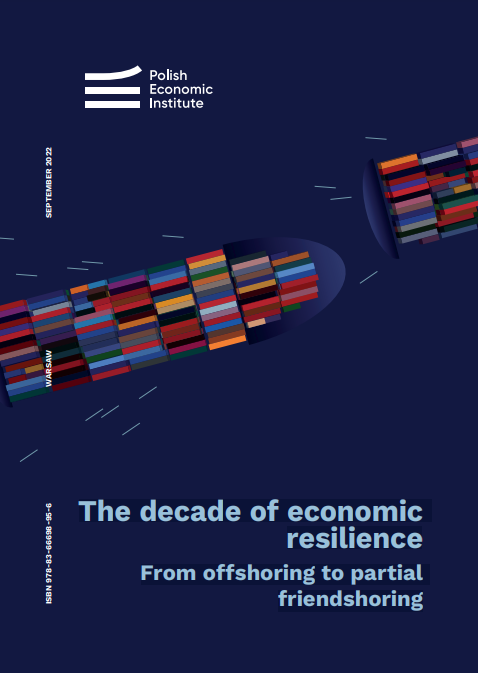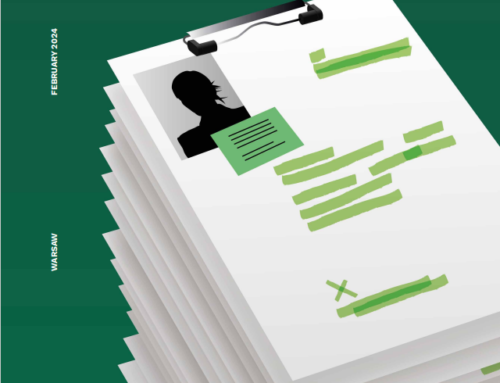Supply chain resilience is becoming a key trend in globalisation

Published: 03/10/2022
Russia’s invasion of Ukraine has been accelerating changes in the existing model of the functioning of the world economy. Supply chain resilience is gaining in importance. The EU is facing a major challenge of reducing its dependence. At present, 76 per cent of oil and 68 per cent of gas imports in the EU are from non-OECD countries. Simultaneously, for as many as 11 of the 30 raw materials critical to the energy transition, the EU’s dependence on imports exceeds 85 per cent. More than 7 per cent of EU imports are products with a high degree of dependence on deliveries from outside the EU-27, including over 4 per cent among key manufacturing ecosystems such as electronics, energy and health. The EU is also twice as dependent as the US on demand in non-OECD countries. Therefore, changes in the current supply chain seem necessary – according to the Polish Economic Institute’s report entitled ‘The decade of economic resilience. From offshoring to partial friendshoring’.
‘For several years at least, there have been lively debates on nearshoring, or the shortening of supply chains, and on reshoring, i.e. the relocation of production facilities back to home countries. We are witnessing a shift from mere discussions to globalisation changes gaining momentum. 2020 and 2021 saw a reversal of the 20-year trend regarding the location of greenfield investment, with more such investments located in developed countries. In 2021, the value was USD 142 billion higher than in developing countries. Russia’s invasion of Ukraine marked the end of the current model of globalisation. Countries and businesses have been considering friendshoring, or the transfer of production to groups of countries with similar values. Friendshoring is also increasingly attractive due to rising production costs in countries such as China, with unit labour costs 285 per cent higher than two decades ago’, says Marek Wąsiński, the head of the world economy team at the Polish Economic Institute.
The US–China trade war, the pandemic and Russian aggression have been changing globalisation
It began with the trade dispute between the United States and China, leading to changes in the functioning of supply chains in sectors affected by additional tariffs. Next, the COVID-19 pandemic shook the production network’s stability: lockdowns led to delays in deliveries, product shortages. Subsequently, maritime transport could not keep up with the economic recovery and the prices observed increased as much as tenfold.
Russian aggression has added political security, which goes far beyond Eastern Europe, as a major consideration to investment calculations. It can be seen as the symbolic start of a period in which economic resilience will be a priority.
It is also reflected in the fact that the Savills Nearshoring Index, evaluating the attractiveness of production locations, ranked seven European countries among the top ten performers. Those were as follows: the Czech Republic, Portugal, Austria, the United Kingdom, Finland, Sweden and Poland.
It is of key importance for the EU to become independent of imported energy commodities
A strong catalyst for changes towards friendshoring could be the energy crisis that Europe will experience as a result of its overdependence on energy imports.
‘The EU has been dependent on Russian fossil fuels for too long and the Russian invasion of Ukraine will force the acceleration of the energy transition. But the transition is a process related to the availability of critical raw materials. To build a 1 MW offshore wind farm, more than 15 tonnes of them are needed – nearly 9 times more than for a gas-fired power plant and over 6 times more than for a coal-fired power plant. In the case of wind farms and photovoltaics, the most consumed materials are copper, zinc and silicon. Nuclear energy is also characterised by higher demand for critical raw materials than conventional power plants. Considering that for 11 of the 30 critical raw materials the EU’s dependence on imports exceeds 85 per cent, securing supplies of those raw materials will be a major challenge’, says Magdalena Maj, the head of the climate and energy team at the Polish Economic Institute.
At the same time, the identification of the largest dependencies shows that 8 per cent of EU imports are exposed to a small number of suppliers and the EU’s low production potential. More than half of the products concern four key ecosystems: electronics, health, energy-intensive sectors and RES. Those should be the priority areas for the EU’s diversification and reshoring activities to focus on.
Economic resilience is not all
Ensuring ‘hard security’ is the most important task of states. Owing to Russia’s invasion of Ukraine, it is necessary to increase military spending for modernising armed forces and improving preparedness for various scenarios of international developments.
‘In making economic policy adjustments, it is vital to be aware that the arms industry is also subject to dependencies going beyond the EU Member States, or even beyond NATO allies or OECD members. It must also be remembered that increases in military spending will not only limit possible investment in other public sectors, but they will also reduce the economic opportunities to create incentives to secure supply chains. Improving the resilience of supply chains and taking care of ‘hard security’ will involve strict cooperation within the EU and among allies. Close cooperation is needed to reduce the exposure to dangerous dependencies in each country rather than only from the perspective of the EU’, summarises Łukasz Baszczak, an analyst of the behavioural economics team at the Polish Economic Institute.
***
The Polish Economic Institute is a public economic think-tank dating back to 1928. Its research primarily spans macroeconomics, energy and climate, foreign trade, economic foresight, the digital economy and behavioural economics. The Institute provides reports, analyses and recommendations for key areas of the economy and social life in Poland, taking into account the international situation.
Media contact:
Ewa Balicka-Sawiak
Press Spokesperson
T: 48 727 427 918
E: ewa.balicka@pie.net.pl
Kategoria: Analysis / Behavioural Economics / Climate and Energy / Gospodarka światowa / Press releases / Report / Reports 2022






